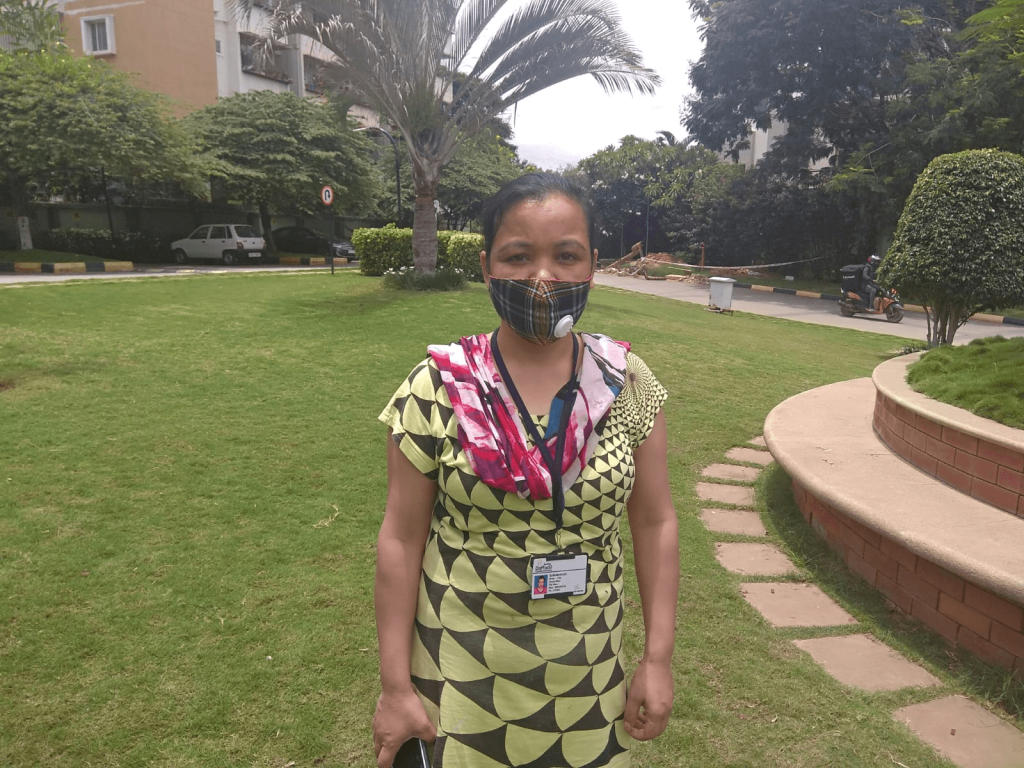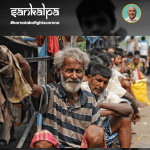


By Ritika Srivatsan
Everyone is affected by the coronavirus, but the most impacted are the underprivileged, such as house helps. They blame the government and the BBMP for the mess. Some are living hand-to-mouth, while others are thankful to their employers for paying them even when they are unemployable. The other house helps are unhappy with firms who did not pay their husbands due to the pandemic.
‘The government ration is not enough’
Mahadevamma M, a 50-year-old maid who works at a 500-flat apartment complex in HSR Layout says she and her family have lost their only means to earn.
“I was working in four houses prior to COVID but it’s now come down to just one. My husband was a mason working on a contract but he’s been out of a job since March. Son is a plumber and daughter-in law worked at a garment factory and now, they are unemployed,” she states.
In Mahadevamma’s case, two households left the city and one isn’t keen on employing a maid. Her toughest challenge in the last few months is that the food grains given by the government, barring rice, are not enough. Two kilos of either wheat or ragi and just one kg of lentils was provided to the family of four each month which was insufficient.
Fortunately, Mahadevamma’s employers continued to pay her salary throughout the lockdown. However, she is earning the bare minimum to keep her household afloat. The looming uncertainty and unaffordable rent are forcing her to consider leaving the city and return to her village, like many of her neighbours.
‘The government should stop food price increase’
Reetha Rai (40) and her family moved to Bangalore from Darjeeling in search of better job opportunities. She was earlier employed as a cook in five households, and her husband had a successful job at a hyperlocal delivery service.
“After COVID, I only work at one house. My husband used to earn close to Rs 7000 a week, but now with great difficulty, he earns about Rs 2000,” she says.
During the lockdown, she was the sole breadwinner as all her employers continued to pay her even when she was unable to work. However, due to the lack of disposable income and savings, their money was either spent on the basic necessities or on their son’s education. Thanks to COVID, Rita’s family is struggling financially.
“The government should help by reducing the prices of vegetables, which are only increasing. We’re poor. All our money is spent on educating our son with the hopes of him leading a better life and any concession from the government would help,” she says.
‘The BBMP is being selective while doling out free food’
Prema Prakash (35), a maid who’s relocated to Bangalore from Chitradurga highlights the problem with the Bruhat Bengaluru Mahanagara Palike (BBMP). “The BBMP gave rations but they would usually only give it to people they know or are friends with. It’s unfair.”
Luckily, her employer provided her with enough groceries and made sure she was able to keep her family well-fed.
Prema’s eldest daughter is studying 2nd PUC that costs her an annual fees of Rs 50,000, excluding other expenses. She plans to free up some money from her lease to fund her daughter’s education, but it’s proving to be a challenge. Her family doesn’t has no reservation that will entitle her to any benefits. She strongly opposes it and feels there has to be a level playing field for everyone.
“I’ve been lucky. Both my children don’t demand much from me. They are happy with what they have,” she says.
Her husband, a tailor with a leading online retailer is unemployed since March, and has received no wages or help from his employer, regardless of the dire situation.
‘We are going back to our hometown’
The families which migrated to Bangalore are the ones facing the most severe difficulties, such as Sabu Mangar (40). Her husband is a cook and worked in eight houses prior to the pandemic; he now works in just one. Sabu worked as a maid in three houses but that’s now come down to two. Most of their employers didn’t pay them through lockdown, which led to severe financial issues. Now, they roughly earn Rs 14,000 per month out of which Rs 8,000 is spent on rent, electricity and water bills.
“My son and I are waiting to leave. At least in Darjeeling, it’s our house… we don’t have to worry about rent or bills. My husband can share an accommodation with his friends and earn here in Bangalore. It will reduce a lot of stress,” she says.
She is not happy with the government’s efforts. “I feel lucky that we at least managed the crisis,” says Sabu. “Many people didn’t have food or the basic necessities, especially those who came to the city for work just before the lockdown. I gave away some of our food grains to help them.”
‘My income is down by half’
Laxmi (37) works in Jayanagar, and currently serves two households compared to four in March. Though her family has suffered setbacks due to the virus, they’re able to cope with the ‘new normal’. Her husband is a vegetable vendor and her son works for Nandini milk booth. While they’re earning lesser than they used to, they have a stable income.




